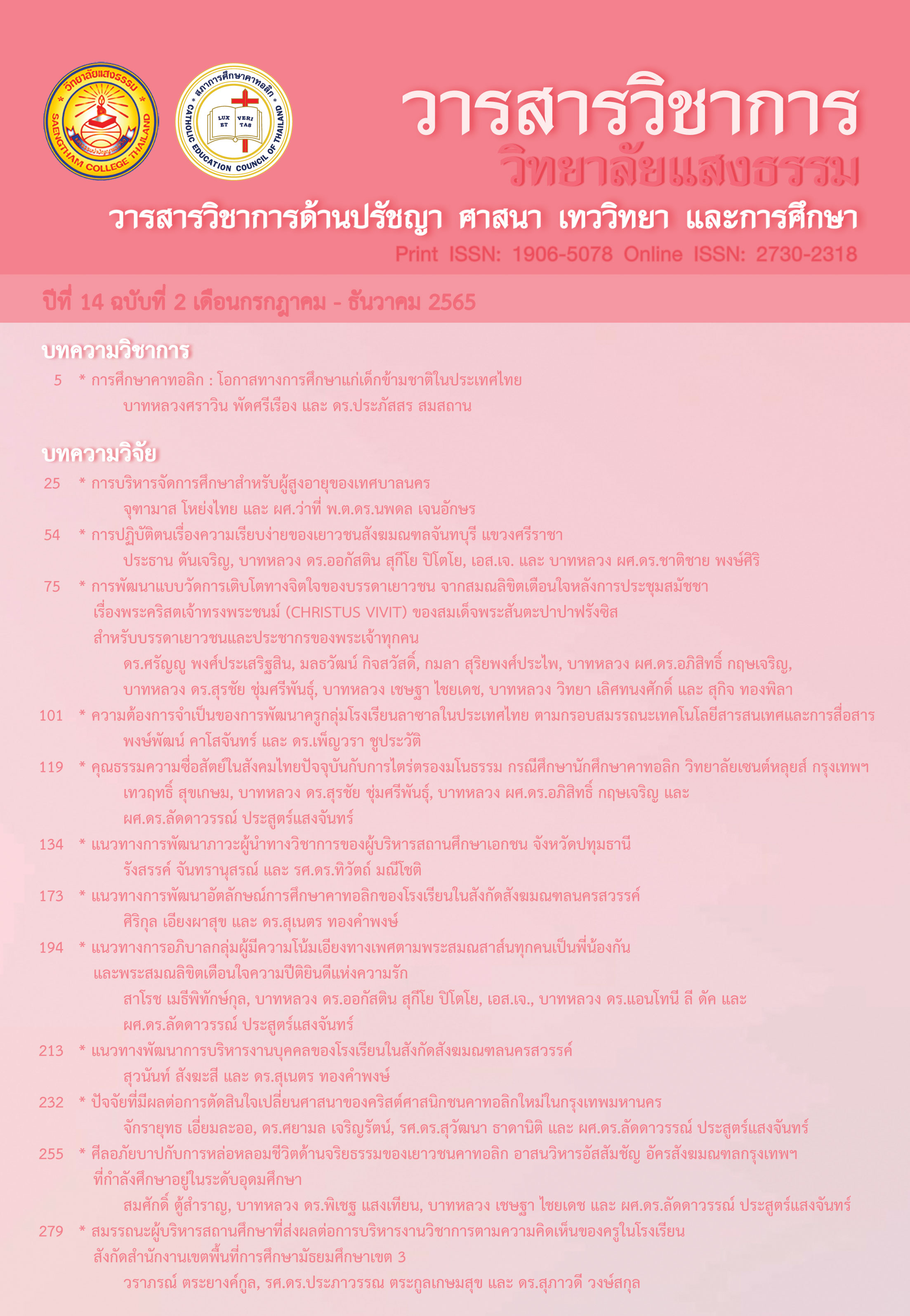The Honesty in thai Society today and a Conscience Examination a Case Study of st. Louis College, Bangkok
Main Article Content
Abstract
This research aims 1) To study the situation of Catholic students in the examination of conscience and the virtue of honesty in contemporary Thai society 2) To propose guidelines for the promotion of the virtue of honesty according to the Church in Catholic Institutions of higher education. The data was gathered from 16 Catholic students of St. Louis College and 6 resource persons. The research methodology was semi-structured interview and topics for group discussion.
The study results were as follows:
- The students’ real situation on the virtue of honesty Most Catholic students valued the virtue of honesty because :
1.1 Catholic families often form and instruct their children to be honest and hold fast to God.
1.2 Catholic institutions of education emphasize the teaching of virtue and ethics.
1.3 Faith and religious teaching are passed on through the good life and example of priests, religious and catechists.
1.4 Catholic students behave as examples for others because their action can give witness for those who see them.
- The guidelines to promote the virtue of honesty for the Church in Catholic Institutions are as followed:
2.1 Good examples from administrators in academic institutions would allow students to appropriate the honesty they can see. In this way, honesty would be practiced so that it would become a good habit.
2.2 Problems should be discussed through reasonable questioning. This give the superior an opportunity to explain reasons for his/her action.
2.3 Punishment should be done with love so that the one punished would realize that they are not hated but loved and the punishment is well-intentioned.
2.4 Awards and recognitions should be given to good students to encourage them to have a good attitude and confidence to do good things regularly.
2.5 Conversations between executives and students and between instructors and students would improve their relationship and closeness. Good feelings would be fostered like those between Jesus Christ and his disciples.
2.6 Ethical attitudes should be promoted in students by consistent formation of virtue and morality, so that all students could integrate their intellect and their action.
2.7 Good attitude and understanding toward extracurricular activities in the college should be fostered.
Article Details

This work is licensed under a Creative Commons Attribution-NonCommercial-NoDerivatives 4.0 International License.
- The academic and research articles, as well as the content and opinions expressed therein, published in Saengtham College Journal are solely the responsibility of the respective author(s).
- Articles published in Saengtham College Journal are the property of Saengtham College. Reproduction, modification, or dissemination of all or part of the content in any form without written permission from Saengtham College is prohibited.
- Articles published in Saengtham College Journal are protected under the Copyright Act.
References
กีรติ บุญเจือ. (2551). คู่มือจริยศาสตร์ตามหลักวิชาการสากล. ศูนย์ส่งเสริมและพัฒนาพลังแผ่นดินเชิงคุณธรรม.
คณะกรรมการคาทอลิกเพื่อคริสตศาสนธรรม. (2553). พระคัมภีร์คาทอลิก ฉบับสมบูรณ์. คณะกรรมการคาทอลิกเพื่อคริสตศาสนธรรม แผนกพระคัมภีร์.
ชนภัทร ศุขะเนตร. (2557). คุณธรรมความซื่อสัตย์ตามจิตตารมณ์คริสตชนในสังคมไทยปัจจุบัน. [การค้นคว้าอิสระปริญญามหาบัณฑิต สาขาเทววิทยาจริยธรรม, วิทยาลัยแสงธรรม].
เชิดชัย เลิศจิตเลขา, บาทหลวง. (2548). คริสตจริยศาสตร์พื้นฐาน. แผนกการพิมพ์ โรงเรียนดอนบอสโก.
เชียร์ นิโคลาส. (2556). การเดินทางสู่ความเชื่อ RCIA. ปิติพานิช.
แปร์ติเล ยอห์น. (2534). ศักดิ์ศรีคริสตชน, เล่ม 2. อำนวยการพิมพ์.
พระศาสนจักรโรมันคาทอลิก. (2540). คำสอนพระศาสนจักรคาทอลิก ภาค 3: ชีวิตในพระคริสตเจ้า (Catechism of The Catholic Church). (ประคิน ชุมสาย ณ อยุธยา, ผู้แปล). โรงพิมพ์อัสสัมชัญ.
ยอห์น ปอลที่ 2, พระสันตะปาปา. (2537). พระสมณสาส์นเรื่องความรุ่งโรจน์แห่งความจริง (Veritatis Splendor). (นรินทร์ ศิริวิริยานันท์, ผู้แปล). โรงพิมพ์อัสสัมชัญ.


